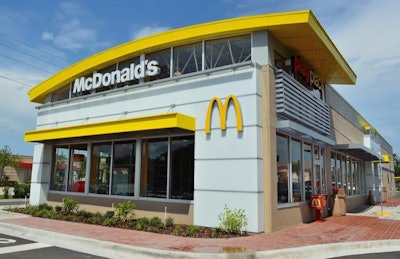
Despite having announced a broiler welfare policy in October 2017, McDonald’s has been targeted by a coalition of six animal rights groups who are pushing the fast-food chain to “do better for chickens.”
McDonald’s new broiler welfare policy was reported immediately on WATTAgNet, and among the policy’s criteria was sourcing chickens for the McDonald’s system that are “raised with improved welfare outcomes.” The policy also called for provisions involving housing enrichments like perches and pecking objects, lighting requirements and the use of controlled atmosphere stunning (CAS) at slaughter.
It also stated that it would establish a global, multi-stakeholder advisory council focused on chicken sustainability, with participation from academics and scientists, suppliers and industry experts, animal welfare and environmental advocates to support its continued journey on chicken sustainability, inclusive of health and welfare.
What set the McDonald’s policy apart from other broiler welfare pledges was that McDonald’s did not commit to raise slower-growing broiler breeds approved by the Global Animal Partnership (GAP) or the Royal Society for the Prevention of Cruelty to Animals (RSPCA).
And that, it would seem, is what has these six animal rights groups wanting more.
‘Working closely with McDonald’s’
In a press release sent to a WATT Global Media editor on March 25, a Sunday, Compassion in World Farming (CIWF) stated that its Food Business Team “is working closely with McDonald’s behind the scenes to implement meaningful changes that will improve the lives of chickens in McDonald’s supply chain.”
But reading lower down in the press release, I determined that CIWF’s definition of “working closely with” and mine are different. To me, “working closely with” means having civil discussions, trying to learn each other’s point of view, and looking for common ground to reach either a consensus or compromise.
That is not what CIWF and the other five groups — Compassion Over Killing, Mercy for Animals, Animal Equality, World Animal Protection and the Humane League — seem to be doing with the campaign announced in the same press release.
One part of the campaign is an online video on the website, TruthAboutMcDonaldsChicken.com, which essentially lambasts McDonald’s for not adopting a policy that includes GAP or RSPCA standards, even though they don’t directly go right out and name GAP or RSPCA.
They try to tug at people’s emotions, with an announcer saying chickens have the same ability to experience fear and pain, just like dogs and cats, later going on to say that the organizations behind the campaign work hard to rescue pets.
They also try to shame McDonald’s by not adapting to their mindset and display several dozen logos of companies whose policies are in line with GAP and RSPCA beliefs. The video specifically praises McDonald’s rivals Burger King, Jack in the Box and Subway, for their commitment to chicken welfare.
Somehow, I doubt McDonald’s and the six animal rights groups reached a consensus that this shame campaign was the best thing for all parties involved. Therefore, CIWF’s claims of “working closely with” seem like a bunch of bunk.
GAP chairperson weighs in
The press release includes a quote attributed to Leah Garces, the U.S. executive director of CIWF.
Garces stated: “It is shortsighted for McDonald’s to not meet customer expectations for improving the lives of chickens, when their competitors are stepping up. American’s care deeply about how farmed animals are treated and that trend is only increasing. Ignoring the writing on the wall — that Americans believe chickens deserve better — is a sure way for your business to get left behind.”
Interestingly enough, Garces wears two hats. Not only does she serve in her stated role with CIWF, but she also is the chairperson of GAP. However, that little detail was left out.
HSUS absent from campaign
A lot of the message being spread by CIWF and the other groups is very similar to what then-Humane Society of the United States (HSUS) CEO Wayne Pacelle wrote in his “A Humane Nation” blog.
Pacelle, who has since left the HSUS amid allegations that he sexually harassed women working for the organization, wrote just after McDonald’s made its broiler welfare announcement that the company “failed to act on the most severe problem within its poultry supply chain, allowing its suppliers to use breeds of chickens that have chronic health problems; the birds are extremely obese and grow so rapidly that some of them have a hard time standing or walking.”
That brings up another topic: Are these six animal rights groups trying to distance themselves from HSUS and while still working on a common goal? Perhaps we'll address that in another blog.
It’s worth noting that Pacelle is a former GAP board member, but he has since been replaced by Dr. Sara Shields, behavior and welfare specialist for Humane Society International (HSI), the global affiliate of HSUS.
Should McDonald’s tell its own story
For these animal rights groups to paint McDonald’s as uncaring for the welfare of chickens seems absurd. By bringing in an advisory council to study the welfare issues, they could possibly find an even more welfare-oriented solution than what has been pushed by these animal rights groups.
Perhaps McDonald’s could run an advertising or public relations campaign bringing attention to its welfare policy and its positive attributes without mentioning those who think it isn’t doing enough. When McDonald’s revamped its menu to be more healthy and promoted its healthier options, it largely worked. With that in mind, an animal welfare awareness campaign could also be effective.
Nearly all of us, I would suspect, have fond memories of eating at a McDonald’s as a child or taking our own children there. For the most part, America loves McDonald’s. I believe people should be more willing to listen to the words of an iconic, kid-friendly eatery than a bunch of mudslingers trying to make someone else look bad in order to further their own agenda.
It’s like Adlai Stevenson used to say, “He who slings mud, generally loses ground.”


















